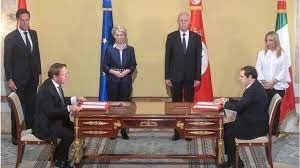
The main starting point for migrants seeking to cross the Mediterranean Sea to reach Europe is now Tunisia.
With 72,000 migrants traveling this year alone, largely to Italy, the EU has been straining to keep up.
The agreement includes $118 million (£90 million) to halt smuggling, fortify borders, and repatriate people.
Due to an environment that has grown more hostile, black migrants in Tunisia have recently been the target of violent attacks.
The president of Tunisia, Kais Saied, blamed “traitors who are working for foreign countries” and said that immigrants were involved in a “plot” to alter the demographics of the nation. Later, he denied having racial bias.
A growing number of Tunisians are attempting to flee the country for Europe as a result of the country’s economic turmoil.
The EU-Tunisia agreement promises to treat border crossing migrants with “full respect of human rights” and aims to create lawful migration routes.
The agreement, which the EU calls “strategic and comprehensive,” also lays out a strategy to accelerate Tunisia’s economic development through “socio-economic reforms” and increased collaboration on a switch to green energy, as well as in education, research, and innovation.
According to the AFP news agency, the European leaders who were present in Tunis for the pact’s signing praised it as a “important step” toward addressing migration and an agreement that would also benefit “the Tunisian people.” These leaders included Italian and Dutch Prime Ministers Giorgia Meloni and Mark Rutte.
In addition, President Saied defended his record on immigration, claiming that the nation “gave the migrants everything it can offer with unlimited generosity,” according to AFP.
A long-term loan from the EU of $1 billion (£764 million) to aid Tunisia in overcoming its economic problems is still in doubt because it is contingent on the results of separate negotiations with the IMF. But since then, the discussions with the Washington-based financing organization have stopped.
In addition to his anti-immigration remarks, President Saied is opposed by Tunisians who believe he is trying to take power for himself.
A number of actions have been taken by President Saied, who was elected in 2019, to increase the powers of the presidency at the expense of parliament and the judiciary. He ousted his prime minister two years ago, put the legislature on hold, and then pushed through a constitution giving him nearly unfettered power the following year.
President Saied denied accusations of a coup, saying that he was just acting to “save the state” after Covid seriously hurt the economy.


Share your thoughts